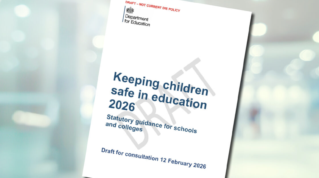A raft of new data from multiple agencies points to a rising tide of families in need, with no other place to turn but their schools, writes Whitney Crenna-Jennings
When Covid-19 shuttered schools and workplaces earlier this year, our thoughts quickly jumped to the children likely to be most affected: those from disadvantaged homes, already 1.5 years behind their peers in school by year 11, those requiring help from local services, and those heavily reliant on the stability provided by schools and teachers.
Just how prepared would we be to support the children whose lives would be deeply disrupted throughout this period?
Before this year’s events, one of the sectors most relied upon by the vulnerable – children’s social care – was under significant pressure. Local authority spending power had fallen considerably since 2010, particularly in disadvantaged areas, leading early family support services to be cut.
This system is a lifeline for some of the country’s most vulnerable children – those who experience highly traumatic or adverse childhood experiences (ACEs): neglect, abuse, domestic violence and parental mental illness. A large body of evidence shows the significant impact of ACEs on lifelong health and wellbeing.
Of course, it doesn’t have to be this way. The right interventions can break the link between childhood trauma and difficulties in adulthood. But at the moment, there is often no guarantee that the right support services are there for children.
There is a clear imperative to invest in these services now
New government data covering the period just before the pandemic on “children in need” – those identified as reliant on local services for their health or development – follows concerning trends seen in the past few years. It shows that the proportion of children over age 16 often with complex needs, making them vulnerable to criminal exploitation, continues to rise, while domestic violence and parental mental ill-health remain the most common causes for social services’ involvement.
The signs are far from promising elsewhere. Since 2019, the number of episodes of social service involvement related to gangs has increased by one-third, while drug misuse by children, trafficking and child mental health episodes have all increased by over 20 per cent.
All this was before the pandemic even struck. But new NHS data covering summer 2020 shows that further to this, rates of probable mental illness in children have risen to one in six, from one in nine in 2017. This is linked to financial stress: children with disorders were almost three times as likely to live in a household that had fallen behind on payments.
Other indicators are also flashing red. The NSPCC has reported a record increase in calls to their domestic abuse helpline – an average of one every hour. Meanwhile the National Crime Agency has reported a ten per cent increase in cases of online grooming stemming from the lockdown.
Taken together, these most recent statistics on the state of vulnerable children in England paint an alarming picture.
Many of these concerns were also reflected in Ofsted’s Annual Report this week, which warned that the state of vulnerable pupils during the pandemic was now a “matter of national concern”.
The pandemic looks to have amplified many of the forces in society that can drive children into a state of high vulnerability, not least the level of existing inequalities. Many families already lived in highly challenging social and economic circumstances – situations in which child mistreatment is more common. The pandemic has extended and deepened this disadvantage.
We have yet to see how the system will cope with the influx of children needing support in the months to come, but there is growing evidence that many children have been unable to access the help they need during the pandemic.
The government still has the opportunity to ensure social care providers and the local agencies they work with have what is necessary to support families in need. There is a clear imperative to invest in these services now. Failure to do so creates the risk of long-term individual suffering and spiraling societal costs.
In the meantime, with local services either under strain or unable to reach children, there is now a real concern that schools – already overburdened following the disruption to education this year – will simply be left to deal with the after-effects.















A 2007 study (‘The Science of Early Childhood Development’) found and reported that:
“The future of any society depends on its ability to foster the health and well-being of the next generation. Stated simply, today’s children will become tomorrow’s citizens, workers, and parents. When we invest wisely in children and families, the next generation will pay that back through a lifetime of productivity and responsible citizenship. When we fail to provide children with what they need to build a strong foundation for healthy and productive lives, we put our future prosperity and security at risk …
“All aspects of adult human capital, from work force skills to cooperative and lawful behavior, build on capacities that are developed during childhood, beginning at birth … The basic principles of neuroscience and the process of human skill formation indicate that early intervention for the most vulnerable children will generate the greatest payback.”
Although I appreciate the study’s initiative, it’s still for me a disappointing revelation as to our collective humanity when the report’s author feels compelled to repeatedly refer to living, breathing and often enough suffering human beings as a well-returning ‘investment’ and ‘human capital’ in an attempt to convince money-minded society that it’s indeed in our best fiscal interest to fund early-life programs that result in lowered incidence of unhealthy, dysfunctional child development.
While some may justify it as a normal thus moral human evolutionary function, the general self-serving Only If It’s In My Own Back Yard mentality can debilitate social progress, even when it’s most needed; and it seems that distinct form of societal ‘penny wisdom but pound foolishness’ is a very unfortunate human characteristic that’s likely with us to stay.